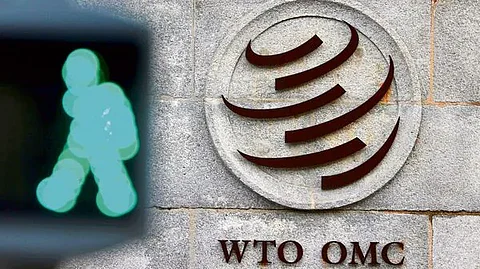

India has formally notified the World Trade Organization (WTO) of its intent to impose retaliatory tariffs on select US-origin products, in response to Washington’s safeguard duties on Indian automobile parts. The move, which could affect $723.75 million in annual trade, comes just days ahead of an anticipated announcement on a bilateral trade agreement between the two countries.
In a note, dated July 3, to the WTO’s Council for Trade in Goods and published Friday, India invoked Article 12.5 of the Agreement on Safeguards. It outlined plans to suspend trade concessions by increasing tariffs on specific US products, in proportion to the injury caused by the US action. The United States had earlier extended safeguard tariffs—25 percent ad valorem—on imports of passenger vehicles, light trucks, and certain auto components from India, effective 3 May. The estimated trade affected by the US move is valued at $2.9 billion.
“The proposed suspension of concessions or other obligations would take the form of an increase in tariffs on selected products originating in the US,” India stated in its WTO submission, adding that the retaliatory duties would mirror the scale of the impact.
A senior Indian government official, speaking on condition of anonymity, said the countermeasure was necessary to uphold India’s WTO rights and discourage unilateral trade actions. “This sends a clear message that India will not let unfair measures go unchallenged, especially when due process under the WTO framework is sidestepped,” the official said.
Earlier, the US had rejected India’s request for WTO consultations over the 25 percent tariff on auto parts, arguing that the duties were imposed on national security grounds and thus not subject to multilateral trade rules, as per a WTO document.
India contends that the US failed to adhere to key WTO requirements, including prior notification and consultations under Article 12.3 of the Safeguards Agreement. These measures, India argues, violate the principles of the General Agreement on Tariffs and Trade (GATT) 1994 and the WTO’s safeguard provisions.
Article 12.3 mandates that a country planning to impose safeguard measures must consult affected members beforehand, giving them an opportunity to understand the rationale and potentially resolve the issue.
While India has not yet revealed the specific products or tariff rates involved in its proposed retaliation, it has reserved the right to enforce the measures 30 days after notification—effectively from early August. It also retained flexibility to revise the product list and tariff structure as needed, signalling a calibrated approach to its countermeasures.
The timing of India’s notification is widely seen as strategic. With both countries aiming for a first-phase announcement of a broader Bilateral Trade Agreement (BTA) before July 9, the move could strengthen India’s bargaining position—particularly in demanding the rollback of US safeguard duties as part of any final deal.
Trade analysts say the WTO notification marks both a legal and diplomatic step by India.
“By invoking Article 8.2 of the Safeguards Agreement, India is asserting its rights under global trade rules. The proposed retaliation—tariff hikes on US goods worth over $700 million—is proportionate to the damage caused,” said Ajay Srivastava of the Global Trade Research Initiative.
However, Srivastava added that it remains unclear whether India will go ahead with the tariffs. “In a previous case involving US steel duties, India held back. Given the delicate timing of trade talks and broader geopolitical dynamics, this could be more of a warning shot than a definitive move.”
(By arrangement with livemint.com)